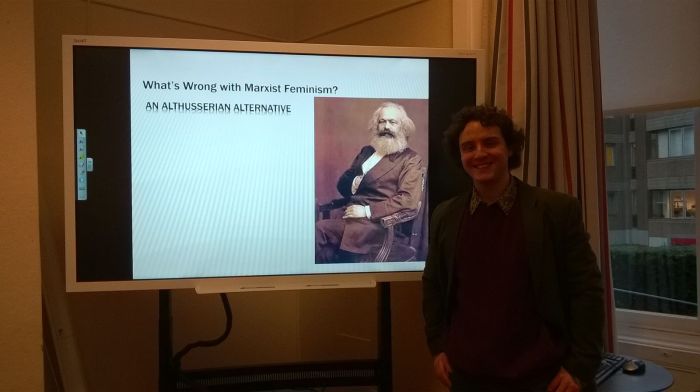The paper this week was given by Yanos Soubieski, a doctoral researcher in the Department of Politics and International Relations, titled: “What’s Wrong with Marxist Feminism? An Althusserian Alternative”. We had a great turnout and a real range of questions in the discussion.

The first half of Yanos’s presentation was centred around criticisms of Marxist feminism. Feminist readings of Marx identify the relations of dominance and abuse that (can) develop from a division of men into the public sphere of production and women into the private sphere of reproduction, that is, producing and raising either female children, who can then also reproduce, or male children, who can enter the workforce, once they have become adults. By being limited from entering the sphere of production, women’s earning potential is severely reduced and they are put into a relationship of dependency on men. Within readings like this, sex antagonisms are reducible to class antagonism caused by the phenomena of private property in capitalism. Yanos highlighted how this is inadequate for understanding patriarchy (loosely understood as a society characterised by male domination over women), because women occupy a lower position according to men in all classes, meaning that dynamics of relations between men and women must be operating independent of, at least to some extent, economic factors. Additionally, patriarchy can be found in non-capitalist societies, such as pre-capitalist societies, and supposedly post-capitalist societies such as in the Soviet Union.
To address these criticisms, Yanos put forward the alternative theory that he is developing in light of recently (2014) published manuscripts from Louis Althusser, a Structural Marxist who was writing most prolifically in the 1970s. Althusser, while not looking at patriarchy, develops a theory of subject formation which lessens the economic determinism in traditional readings of Marx. What we understand as society is a composite formation of different structures, such as the media, the school, the family, each of which attempts to maintain its own stability through ideological interpellation. We become subjects (that is, who we understand ourselves to be) through our recognition of ourselves in relation to an external Other. In a crude summary of Althusser’s example, when a policeman hails us out on the road and we turn around, we have become a subject because we have realised that the policeman is talking to us and that we are obliged, through our relationship with the policeman, to listen to him and turn around. Yanos identifies the family structure as the primary location of subject formation, as we are interpellated as subjects by our parents and the rest of the family before we are even born. This is a crucial point for Yanos’s application of Althusser to patriarchy, because sex plays a key role in subject formation of a new child, such as the name chosen, the pronouns used to describe the child, without even going into clothing, toys and the decoration of the nursery.
A range of points were brought up in the discussion, such as Vicky, an external visitor from Cardiff, sharing her personal experience from Cuba. Cuba is ostensibly a Communist country, but still has prevalent sexism and sex divisions, which backs the criticism of Marxist feminism that sex antagonisms operate in a different way to class antagonisms. Dr Andreas Behnke highlighted that woman and men are not so clearly divided as they once were, with women visible and active in the workforce. Yanos countered this with the observation that women still suffer from inequality, being on average paid less, occupying a minority of high-level positions and occupying a majority of part-time and other precarious job roles compared to men. Patriarchy continues to have a strong presence in the ordering of society, despite the decades of protest and efforts for change for women. A subsequent more general Marxist response to this would also be that a solution is not to open up the exploitative capitalist workplace to women as well as men, but to remove the exploitative structure in the first place.
We thank Yanos for giving his paper and engaging with the discussion afterwards. The next seminar will be on Thursday 3rd December at 1-2pm in G09, given by Monica Palmero Fernandez of Archaeology on “The Realm of Goddesses in Ancient Mesopotamia”. We look forward to seeing you there!